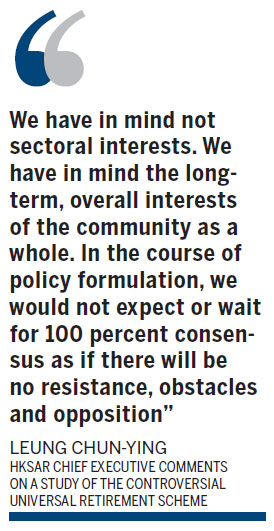Umbrella for the poor, the retired: CE
Updated: 2013-01-17 06:43
By Joseph Li(HK Edition)
|
|||||||

Efforts to ameliorate poverty are among the key elements of Chief Executive (CE) Leung Chun-ying's debut Policy Address. One scholar praised the address as setting out the right directions for the future by attempting to tackle the controversial long-term welfare issue.
Nelson Chow, chair professor of social work and social administration at the University of Hong Kong (HKU), said some may be disappointed at the absence of instant welfare measures, but Leung was right to do so. If he announced extensive measures to alleviate poverty, he would pre-empt the Commission on Poverty which still has work to do.
Chow said he was particularly pleased with the establishment of an official poverty line, adding he also took note of Leung's position that the government would study the possibility of converting the work incentive transport allowance into a subsidy for low-income families. This shows that Leung understands the plight of the working poor, he said.
"It is right for the government to set a poverty line, because society has a consensus on this," Chow told China Daily. "With a poverty line, the government will be able to differentiate people who need social services."
Social welfare constituency lawmaker Peter Cheung praised Leung as showing the courage to set a poverty line while his predecessors ignored calls to do the same. "Even if there is only one person below the poverty line, the government needs to help him," he said, adding there are about 1.2 million people living in poverty in Hong Kong.

The government also plans to introduce a community care service voucher pilot scheme to help the elderly obtain services. Initially, the value of the voucher will range from HK$2,500 to 4,000. The scheme will benefit 1,200 elderly people.
Cheung is also pleased that the government formally acknowledges the existence of the so-called "have-nots" - those who do not pay tax, live in public housing or receive social security. In the past, they are not identified and left alone. In Cheung's view, it is good that Leung should recognize the existence of these people who are on the fringe of certain welfare policies and assist them.
Meanwhile, the authority will also set up a special committee to look into standard working hours to relieve the city from overwork.
In his maiden Policy Address, Leung said a task force under the Commission on Poverty would conduct an in-depth study of the universal retirement scheme in an open, pragmatic manner, before deciding how to take forward protection for the retired.
Both issues are controversial, with the business sector maintaining vigorous opposition. The CE stressed however, that he would not shirk from addressing the issues because a certain sector of the community was opposed.
"We have in mind not sectoral interests. We have in mind the long-term, overall interests of the community as a whole. In the course of policy formulation, we would not expect or wait for 100 percent consensus as if there will be no resistance, obstacles and opposition," he said at a press conference.
HKU's Chow welcomed the study of a universal retirement scheme. Pointing out the scheme has been under debate for three decades, Chow noted: "The government should fully explore the issue and decide whether to go ahead. If it decides to go ahead, then where will the money come from?"
Apart from strong opposition from the employers/business sector, he said some employees are also resistant to universal retire protection because they don't want to give more after paying 5 percent of their salaries to the mandatory provident fund scheme.
He also said employees should contribute to their own retirement protection scheme without relying on funding from the government's coffer.
joseph@chinadailyhk.com
(HK Edition 01/17/2013 page1)